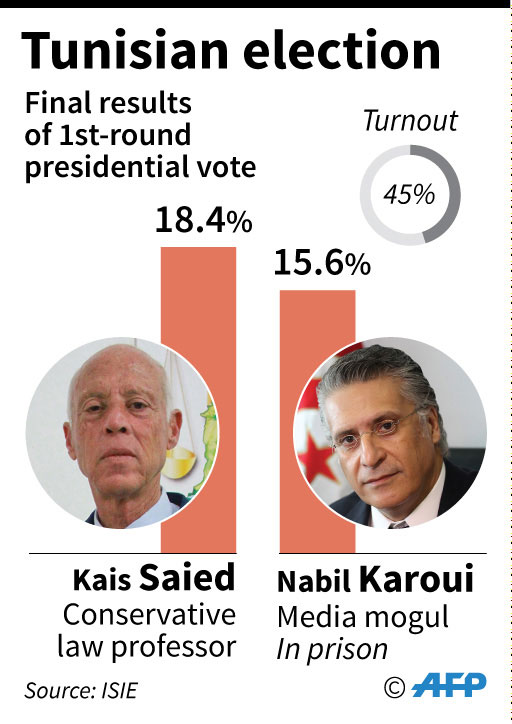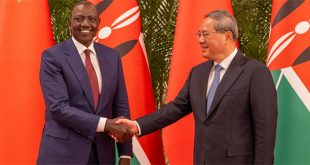
Tunis, Tunisia | AFP | Official results in Tunisia’s presidential election confirmed on Tuesday a duel in the second round of voting between law professor Kais Saied and imprisoned media mogul Nabil Karoui.
Saied led the first round with 18.4 percent of the vote, and is set to challenge Karoui in polls next month after he earned 15.6 percent, according to the electoral commission (ISIE).
Sunday’s election was the country’s second free vote for head of state since the its 2011 uprising.
The result is a major upset for Tunisia’s political establishment, in place since the fall of dictator Zine El Abidine Ben Ali eight years ago after the mass protests that sparked the Arab Spring revolts.
The Islamist-inspired Ennahdha party, a main force in parliament, came third with almost 12.9 percent of the vote for its first-ever presidential candidate Abdelfattah Mourou.
Shortly before the official results were announced, Ennahdha congratulated the two winners, implicitly dispelling rumours that Karoui would be disqualified over alleged violations during his campaign.
Any such disqualification would have seen Mourou qualify for the final runoff.
ISIE has said it is investigating alleged electoral violations, including campaigning on behalf of Karoui by Nessma TV, founded by the media mogul.
“We are analysing” complaints, ISIE spokesman Hasna Ben Slimane said.
“But to unseat a candidate, there must be a valid and solid reason” to believe there was a violation, he said.
Observers from the European Union said the first round has been “transparent”.
But it called for the candidates to have the “same opportunities” to campaign, in an apparent allusion to Karoui.
– ‘Get out’ –
Depending on potential appeals, the second round could be organised for October 6, the same day as legislative elections, or on October 13, ISIE said.
The two candidates — though very different — have drawn on the same “anti-system” sentiment among the electorate, spurred by exasperation with the status quo.
Unemployment plagues about 15 percent of the population, especially young graduates, while inflation eats away at already low incomes.
“With these presidential polls, we’re back to the situation in 2011,” said Mohamed Marzouk, the head of civil society organisation Murakiboun, which has been observing the elections.
“The voters’ message is: ‘Everybody out, and then we’ll see’,” he said.
The two leading candidates “have been preparing the ground for years. They have shown that elections don’t happen on Facebook — at least not only,” Marzouk said.
Le Quotidien newspaper earlier said Tunisian voters had “preferred to venture into the unknown rather than extend a hand again to those who betrayed their hopes”.
Saied, a fiercely independent academic aged 61, advocates a radical decentralisation of power, with local democracy and the ability to remove elected officials from office during their mandates.
Karoui, a 56-year-old media magnate, is under investigation for alleged money laundering and has been in pre-trial detention since August 23.
Karoui’s arrest in the runup to the election cemented his status as an outsider, despite being a longtime key supporter of president Beji Caid Essebsi, whose death on July 25 brought forward the polls.
Appeals to have him freed before the election were rejected, but his lawyers were planning to refile for his release after the results were confirmed.
Karoui remains eligible to run despite his imprisonment, as long as any conviction does not also specifically deprive him of his civil rights, according to ISIE.
 The Independent Uganda: You get the Truth we Pay the Price
The Independent Uganda: You get the Truth we Pay the Price



